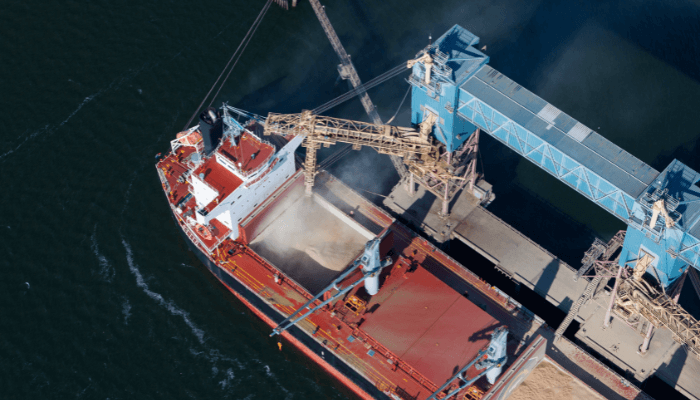Ukraine hoped the UN-brokered contract would ease global food shortage as the war-torn nation planned to restart shipping grains from the Black Sea ports this week.
Moscow brushed aside the rising concerns that the deal could again be derailed owing to a Russian missile strike that hit Ukraine’s Odesa port on Saturday, mentioning that it targeted only the military infrastructure. Volodymyr Zelenskyy, the Ukrainian President, denounced the latest attack as “barbarism,” which reflects how Moscow can’t be trusted.
A worldwide wheat shortage and rising energy prices in Europe are some of the most far-reaching impacts of Russia’s war against Ukraine, threatening millions in the poorer countries with hunger and resulting in fears of overheating supplies in the coming winter.
Officials from Ukraine, the UN, Russia, and Turkey agreed on Friday there would be no attacks on any ship sailing via the Black Sea to Bosphorus Strait in Turkey and on to markets. They are preparing for a joint monitoring center.

A senior government official from Ukraine reported that he was hoping that the first grain shipment from Ukraine, a supplier major, would be possible this week, with the shipments from other ports spoken of in the deal in about two weeks.
In the next 24 hours, we’ll be prepared to resume exports from Ukraine’s ports. The port of Chornomorsk, then there will be Odesa, and then the port of Pivdeny, the deputy infrastructure minister Yuriy Vaskov reported at a news conference.
As the war lasted six months, Ukraine’s military was informed about the Russian shelling in the eastern Ukrainian region overnight. It said that Moscow continued to prepare to launch an assault on Bakhmut in Donbas, which Russia targets on seizing on behalf of its separatist proxies.
Ukraine said its forces had used U.S-supplied HIMARS rocket systems to destroy 50 ammunition depots in Russia from when they received the weapons around last month. Russia did not immediately comment, but its Defense Ministry said its forces had destroyed an ammunition depot for HIMARS systems.
Grain Export
Russia’s Black Sea fleet has prevented grain exports from Ukraine since Moscow’s February 24 invasion. A UN official referred to Friday’s deal as a “de facto ceasefire” for facilities and ships covered in the agreement.
Moscow denies responsibility for the food crisis, blaming the sanctions for hampering the food and fertilizer business and Ukraine for mining approaches to its ports.
Ukraine’s military mentioned that two Kalibr missiles fired from Russia’s warships on Saturday hit a pumping station at Ukraine’s Odesa port as well, as the country’s air defense forces shot down two others. They did not hit the grain storage area or result in significant damages.
Russia said the strikes hit a weapons store based in Odesa and a Ukrainian warship. They were fired with precision missiles.
They are unrelated to the infrastructure used for grain export. And it should not – and will not severely impact – the beginning of shipments, Dmitry Peskov – a Kremlin spokesman, mentioned on Monday.
Peskov signaled that Russia’s European natural gas exports restarted at reduced volumes last week. However, the volume could also soon increase.
Diplomats from the EU that have joined the US in imposing sanctions on Russia but continued to purchase its gas were prepared to discuss targets on Monday for member states to cut down on gas use. Russia has cut down its supplies to Europe and has blamed the sanctions.
Global wheat prices increased sharply on Monday owing to uncertainties regarding the grain agreement, clearing most of the falls observed on Friday when traders were anticipating a relaxation of supply shortages.
Referendums
As well as Ukraine’s eastern Donbas region, Russian forces have set sights on southern Ukraine, where they have already occupied two areas north of the Black Sea peninsula dubbed Crimea, which it annexed from Ukraine back in 2014.
Russia’s news agency RIA reported that the two regions, Kherson and Zaporizhzhia, may also conduct referendums in September 2022 on joining Russia, mentioning Vladimir Rogov. He is a member of the Russian-appointed Zaporizhzhia’s provincial government.
The Ukrainian military updated regarding progress in what is referred to as a counter-offensive in Kherson, mentioning that its forces moved within the firing range of Russia’s targets. Reuters could not verify the reports independently.
Britain informed that the Russian commanders keep facing a dilemma – whether to bolster defenses at Kherson and areas close by or resource offensive toward the east.
Moscow charged about 92 members of the armed forces of Ukraine with crimes against humanity. It also proposed an international tribunal to tackle the examination, Alexander Bastrykin, who leads Russia’s investigative committee, reported.
The declaration comes after the US and more than 40 other countries agreed on July 14 to coordinate examinations into the suspected war crimes in Ukraine, especially concerning alleged actions by forces of Russia and its proxies.
Putin refers to the war as a special military operation aimed at demilitarizing Ukraine. Kyiv and the West refer to the war as a baseless pretext for land grab.
References: News 18, Aljazeera